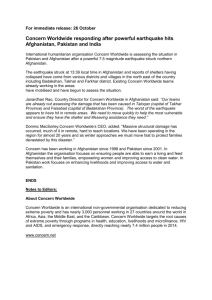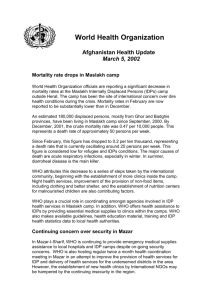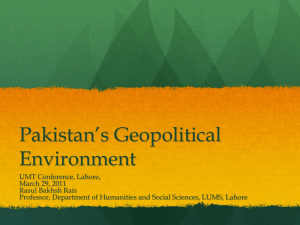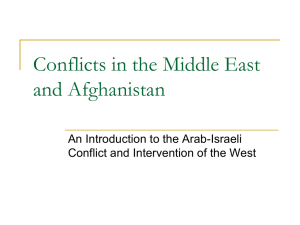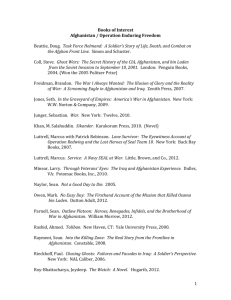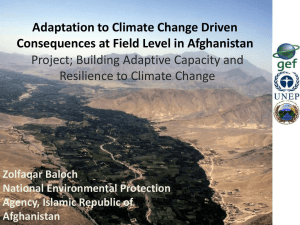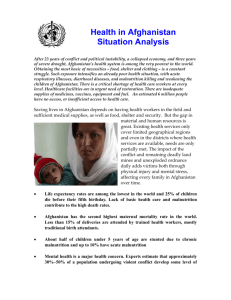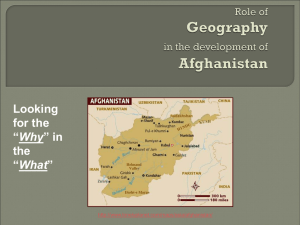Afghanistan Crisis, Rolling notes
advertisement
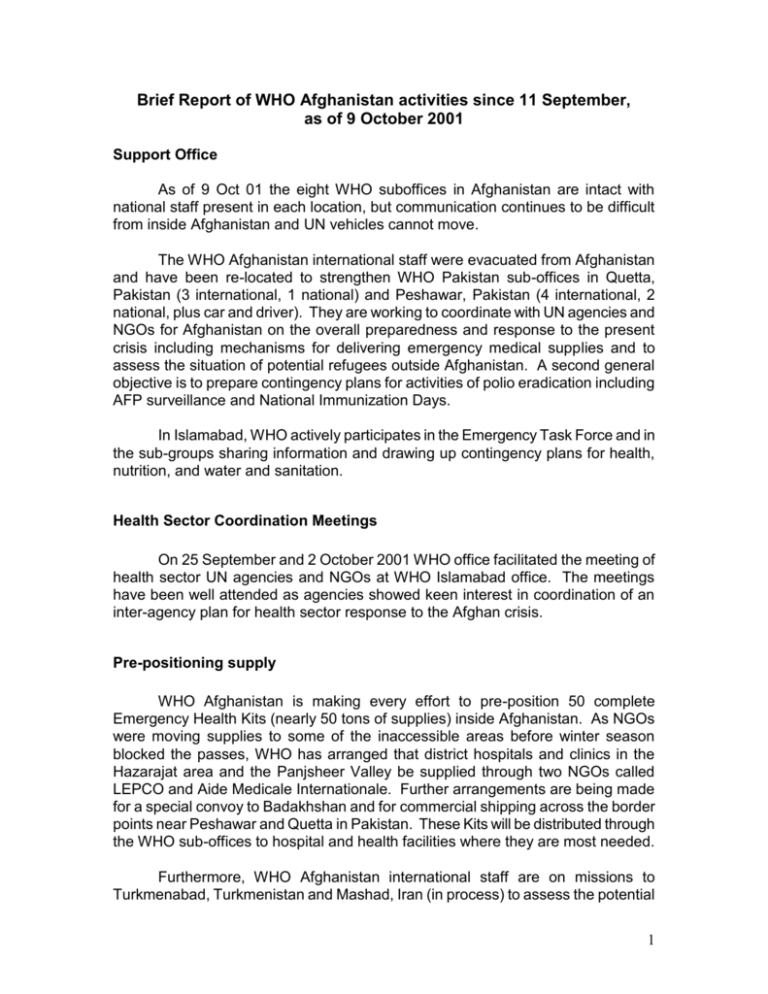
Brief Report of WHO Afghanistan activities since 11 September, as of 9 October 2001 Support Office As of 9 Oct 01 the eight WHO suboffices in Afghanistan are intact with national staff present in each location, but communication continues to be difficult from inside Afghanistan and UN vehicles cannot move. The WHO Afghanistan international staff were evacuated from Afghanistan and have been re-located to strengthen WHO Pakistan sub-offices in Quetta, Pakistan (3 international, 1 national) and Peshawar, Pakistan (4 international, 2 national, plus car and driver). They are working to coordinate with UN agencies and NGOs for Afghanistan on the overall preparedness and response to the present crisis including mechanisms for delivering emergency medical supplies and to assess the situation of potential refugees outside Afghanistan. A second general objective is to prepare contingency plans for activities of polio eradication including AFP surveillance and National Immunization Days. In Islamabad, WHO actively participates in the Emergency Task Force and in the sub-groups sharing information and drawing up contingency plans for health, nutrition, and water and sanitation. Health Sector Coordination Meetings On 25 September and 2 October 2001 WHO office facilitated the meeting of health sector UN agencies and NGOs at WHO Islamabad office. The meetings have been well attended as agencies showed keen interest in coordination of an inter-agency plan for health sector response to the Afghan crisis. Pre-positioning supply WHO Afghanistan is making every effort to pre-position 50 complete Emergency Health Kits (nearly 50 tons of supplies) inside Afghanistan. As NGOs were moving supplies to some of the inaccessible areas before winter season blocked the passes, WHO has arranged that district hospitals and clinics in the Hazarajat area and the Panjsheer Valley be supplied through two NGOs called LEPCO and Aide Medicale Internationale. Further arrangements are being made for a special convoy to Badakhshan and for commercial shipping across the border points near Peshawar and Quetta in Pakistan. These Kits will be distributed through the WHO sub-offices to hospital and health facilities where they are most needed. Furthermore, WHO Afghanistan international staff are on missions to Turkmenabad, Turkmenistan and Mashad, Iran (in process) to assess the potential 1 mechanisms of sending supplies and other technical and material support to WHO sub-offices in the North and West of Afghanistan. NIDs Fall National Immunisation Days (NIDs) (from 23-25 September 2001) were completed in all regions of Afghanistan led by the World Heath Organisation and UNICEF in combination with many implementing partners. Special teams were assigned for cross-border areas in collaboration with NIDs in Pakistan to immunize children whose families are trying to cross the border into Pakistan. AFP surveillance Contingency plans have been made for collection of stool specimens and transferring them to the laboratory for analysis. One more case of polio was labconfirmed in the Southern Region, bringing the total to nine. The international staff from each sub-office has been in contact with the regional EPI officers regarding AFP surveillance. At least eleven AFP cases have been detected from four regions, Northern (1), Western (2), Kunduz (2), Ghazni (4): The specimens are kept in below zero freezers, and trying WHO is trying to establish routes and means for transportation of specimens. Herat IDP Camps As well as chairing the health forum for the camps, and coordinating response to potential epidemics, WHO tries to help the NGO clinics cope with large numbers of patients by bridging the gaps in drug supplies that unpredictable funding and outbreaks of disease bring. It also supports training of health workers in matters from diagnosis and disease management to health education. WHO has initiated a project for training 100 traditional birth attendants to work in the IDP camps in Herat area. Faizabad Water and Sanitation Projects In northeastern Afghanistan, NGO activities and many UN activities are continuing as normal. WHO, Afghanistan along with WFP, UNICEF and Faizabad Municipality completed the second phase of the Faizabad Water Supply project in 2001. Presently Faizabad residents are able to get their domestic water needs through 116 stand posts, installed mostly at congested parts of the old and new city. This project has enabled all the citizens of Faizabad to enjoy access to safe drinking water and hence be protected against different water related diseases. 2 Since the completion of the water supply project the number of annual serious diarrhea cases has been cut in half. In August 2001, WHO Afghanistan initiated a water, sanitation and hygiene education program for IDPs in Faizabad. To provide safe drinking water for about 450 IDP families are settled in three IDP camps in Faizabad city, a community water treatment plant (consisting of sedimentation basins, slow sand filters and clear water storage tanks) has been constructed. To fulfill the needs for a safe excreta disposal for the IDP camps, construction of 90 cabins of VIP latrines along with 60 baths were undertaken. In addition, WHO arranged for two teams of male and female community health workers to visit the camps on a regular schedule and disseminate hygiene education messages to women, children and men residing in the camps. TB Control activities For areas where TB control services have been cut back due to the displacement of patients and staff, WHO has distributed a guideline for continguing treatment either as DOTS or standard treatment depending on the circumstances. In other areas such as Ghazni, WHO has increased monitoring activities. WHO sent a regional TB Control Team to Gardez and Chamkani of Paktia and Khost provinces respectively to monitor the activities of the TB Control Programme, to conduct on-job training on different aspects of TB control for the TB control staff, to prepare TB supply list, to distribute TB recording/reporting formats and to collect TB reports on the 3rd quarter of the year. IDPs of the North WHO in Mazarisharif has provided back up to the NGO consortium overseeing the Sakhi Camp in terms of disease surveillance and health supplies. WHO provided 10,000 bednets for distribution to those at highest risk of malaria in IDP camps in Balkh, Kunduz and Baghlan Provinces. In Kunduz, WHO sponsored work on the water and sanitation projects for Kundoz IDPs is going on well. About 65 latrines and 22 bathrooms have been completed. WHO staff regularly monitor the projects. Provision of essential obstetric care and clean delivery kits for mothers In response to the current crisis, WHO, UNFPA, and UNICEF have formed a sub-committee for coordinating activities with regard to provision of essential obstetric care for both the displaced and internally stuck people (IDPs and ISPs) inside Afghanistan as well as for the potential refugees in Pakistan. An estimated 5% of the population among the above will be pregnant and require antenatal, delivery, post-natal or emergency obstetric care services. WHO has procured and is in process of distributing inside Afghanistan disposable clean delivery kits for 4000 3 expecting mothers and appropriate kits of drugs and essential obstetric care supplies and equipment for every level of obstetric care provider and health facilities- trained traditional birth attendants, midwives, basic health centers and referral centers. 4
